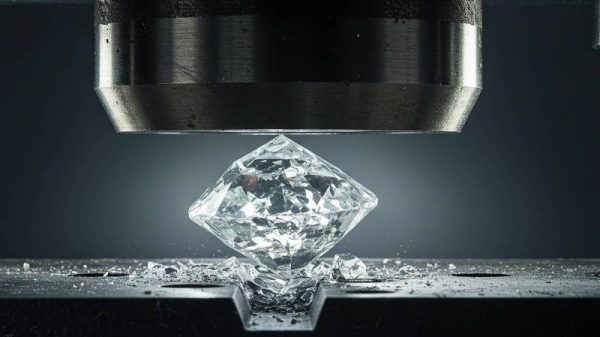Overview
Rare earth elements (REEs) collectively represent some of the most critical minerals in the world. This group of interrelated minerals has an incredibly broad range of applications — everything from military equipment to consumer electronics. They are also pivotal in the global transition to clean energy and decarbonisation. Neodymium magnets, for instance — composed of neodymium, iron and boron (NdFeB) — are increasingly being used in wind turbines and electric vehicle motors. Dysprosium and Terbium are added to high performance NdFeB magnets to increase the magnet’s resistance to demagnetisation, thereby improving performance through higher operating temperatures.
REEs are also essential to the production of devices such as smartphones, lending context to the news that alongside other critical minerals such as lithium and cobalt, global demand for REEs is expected to increase by as much as 600 percent over the next several decades.
It is clear the world needs to ramp up rare earths production — a challenge DY6 Metals (ASX:DY6) understands. This mineral exploration company holds a 100 percent interest in six highly prospective critical metals projects in Malawi. As one of the most stable jurisdictions in Southern Africa, Malawi is home to considerable mineral wealth — a fact which, alongside its mining-friendly government, has seen the country enjoy significant mining investments over recent years.
Successful completion of maiden 35-hole RC and 8 DDH drilling program for 3,643m RC and 900m of DDH at Machinga HREE and Nb project was completed in September 2023. Assay results of the final diamond Drill hole program returned an average of 29 percent heavy rare earth oxide to total rare earth oxide (HREO:TREO) and 3.6 percent dysprosium (Dy) and terbium (Tb) (DyTb:TREO) at a cutoff grade of >0.25 percent TREO.
DY6 expanded its overall strategic footprint in Malawi to a total of 1,080 square kilometres by staking a carbonatite ring complex in southern Malawi known as Tundulu and several licences considered to be highly prospective for lithium. An exclusive prospecting licence application for 91.5 square kilometres was submitted over Tundulu while an additional four exclusive prospecting licence applications totaling 746.7 square kilometres have also been submitted for the company’s Mzimba (West, Central and South) and Karonga projects.
Company Highlights
DY6 Metals is an ASX-listed company building a portfolio of critical minerals projects in Malawi that are highly prospective for rare earths, niobium and lithium.The company has completed a successful $7-million initial public offering.DY6 employs an experienced management team which includes geotechnical experts and mining professionals.DY6’s projects feature near-surface, high-grade historical drillings and/or workings, and are significantly underexplored with considerable potential to define new mineralised zones.Malawi is also known for its excellent operating infrastructure, mining-friendly regulations, and push for renewable energy.
Key Projects
Machinga
Machinga project location
Located within the Chilwa Alkaline Province (the same province that hosts Lindian’s Kangankunde project), Machinga is DY6’s flagship project. The original exploration licence, covering 42.9 square kilometers, was acquired in light of uranium channel radiometric anomalies located by a country-wide airborne survey in the 1980s. In 2023, the Malawian Department of Mines granted DY6 Metals an additional licence area for Machinga, which increased its total area to 197 square kilometres. The Machinga radiometric anomaly is continuous along a strike of approximately 7 km, indicating that potential to discover further eudialyte-hosted REE mineralisation may be significant.
Project Highlights:
A significant HREE project40km east of Lindian’s (ASX:LIN) “Kangankunde”Successful completion of maiden 35-hole RC and 8 DDH drilling program for 4,543m at Machinga HREE and Nb projectInitial exploration focused on historical 2010 drill program for 4000m (Machinga North)Future exploration includes extending NE into new licence EL0705 and south along the anomalous zone2023 Maiden Reverse Circulation and Diamond Core drill Assay significant results:15.1 metres @ 1.01 percent TREO, 0.36 percent Nb2 O5 from 23.9 metres (3.71 percent Dy/ Tb/TREO) incl. 4 metres @ 1.75 percent TREO, 0.63 percent Nb2 O5 from 33 metres (3.8 percent Dy/Tb/TREO) drilled downdip (MDD007)13 metres @ 0.65 percent TREO, 0.25 percent Nb2 O5 from surface; incl. 1 metres @ 1.06 percent TREO, 0.37 percent Nb2 O5 from 7 metres, and 1 metres @ 1.28 percent TREO, 0.42 percent Nb2 O5 from 9 metres (MR019)7 metres @ 1.42 percent TREO with 0.49 percent Nb2 O5 from 65 metres (MR011) – 16 metres @ 0.54 percent TREO with 0.21 percent Nb2 O5 from 78 metres, incl. 3 metres @ 1.63 percent TREO, 0.7 percent Nb2 O5 from 87 metres (MR005) 11 metres @ 0.74 percent TREO, 0.29 percent Nb2O5 from surface (3.8 percent DyTb/TREO) incl. 2 metres @ 1.36 percent TREO, 0.49 percent Nb2O5 from 6 metres (4 percent Dy/Tb/TREO) (MR024)
Mineralisation
Strongly mineralised hydrothermal breccia system striking NW-SE and dipping shallowly ~35° to the NE has been confirmed by the recent drillingDrill cross sections demonstrate excellent continuity with radiometric contour predicting the mineralised higher-grade zoneHigh grade HREE-Nb confirmed from RC and DD drill results at Machinga Central ZoneThe mineralisation at the Machinga alkaline complex contains a higher proportion of valuable dysprosium-terbium (DyTb) with results indicating an average 3.6 percent DyTb:TREO in samples greater than 0.25% TREO.
Salambidwe Project
Straddling the Malawi-Mozambique border, the Salambidwe project covers an area of 24.9 square kilometres, associated with the Salambidwe Ring Complex, which is known for hosting multiple notable carbonate deposits. Geology in the area is also associated with high radiometric values, typically associated with REE mineralization.
Project Highlights:
Considerable Potential: The Salambidwe project is a virgin rare earth carbonate prospect. While no drilling has taken place at the project, rock-chip samples returned 2.05 percent TREO including 214 ppm dysprosium oxide.Area Geology: With a diameter of approximately 6 kilometres, the Salambidwe Ring Complex is largely syenite and nepheline syenite with an agglomerate rock core. Based on this geology and the radiometric signal, the project has the potential for REE mineralisation.
2023 Exploration Program
DY6 has completed the initial geochemical and geophysical exploration programs at Salambidwe.Analytical results have been received for the grid-based soil and rock chip sampling. Results from the 128 soil and 386 rock chips expand the known area of anomalous responses.The maximum values from separate rock chip samples were 1.21 percent TREO & 0.12 percent Nb2O5; maximum values from separate soil samples were 0.23 percent TREO & 0.09% Nb2O5.The 45-line kilometre airborne geophysical program confirmed the highly concentric nature of the intrusive complex.DY6 is assessing the combined geochemical and geophysical data to refine targets prior to a maiden drill program.
Karonga Lithium Project
In 2024, DY6 Metals entered into an exclusive option to acquire an 80 percent interest in the Karonga lithium project, with granted licence EPL0659, spanning 39 square kilometres in northern Malawi. DY6 Metals Ltd submitted four (4) exclusive prospecting licence applications totalling 746.7 km2 in northern Malawi for tenements it considers to be highly prospective for lithium. The Mzimba licences cover a large area (710.5km2) and remain significantly underexplored for LCT pegmatites.
Reconnaissance field work at the Karonga identified some pegmatites of up to 500 metres in length with the potential to host lithium mineralisation. Rock chip samples include visually observed spodumene and lithium micas (lepidolite). Initial reconnaissance indicates huge potential for a major Li discovery and initial ground reconnaissance sampling at Mzimba South licence returned grades of 6.2 percent Li2O (lepidolite mica) and 0.3 percent Li2O (pegmatite rock assemblage), and also high in cesium and rubidium with significant potential for LCT pegmatite hosted mineralisation. The first pass program at Mzimba South consisted of 8 samples from 5 outcrop locations, where artisanal workers have been excavating pegmatites for gemstones (tourmaline, aquamarine and beryl).
Tundulu REE Project
‘Tundulu’ is a known carbonatite ring complex with abundant REE mineralisation, predominantly in the form of bastnaesite and apatite. Shallow historical drilling (1988) (>max depth of 50 metres), includes:
41 metres @ 3.7 percent TREO, from 8 metres (JMT-22)17 metres @ 1.3 percent TREO, from surface and 14 metres @ 1.1 percent TREO, from 21 metres (JMT-14)11 metres @ 2.2 percent TREO, from 17 metres and 14 metres @ 4.1 percent TREO, from 36 metres (JMT-17)14 metres @ 1.1 percent TREO, from 3 metres (JMT-07)
Samples from a recent reconnaissance field visit at Tundulu have been despatched for laboratory analysis. Tundulu complements the company’s existing REE and critical metals portfolio in Malawi. A geological team recently undertook a reconnaissance field visit over parts of the licence application area and samples have been submitted for laboratory analysis in South Africa.
Ngala Hill
Situated just east of the Thyolo Fault, the Ngala Hill Project’s zone of mineralization contains a strong magnetic anomaly indicative of an oxidized intrusive. Like Salambidwe, Ngala Hill is a relatively fresh asset. It has not been the target of any significant modern exploration efforts, though the results from historical works are nevertheless promising.
Project Highlights:
Multiple Mineralization Zones: Ngala Hill’s deposit takes the form of an ultramafic chonolith that intrudes onto an underlying Proterozoic Basement Complex quartz feldspar-amphibole gneisses. The chonolith is also cut by Karoo-age dolerite dykes. Currently, DY6 has identified three zones of palladium-rich palladium-platinum-gold-copper mineralization worthy of follow-up.Promising Historic Results: After trenching the deposit in 2000, Phelps Dodge identified the following mineralization:12 metres at 3 grams per ton (g/t) platinum group elements (PGE)+gold70 metres at 1.12 g/t PGE+gold, including 8 meters at 3.3 g/t PGE+goldPresence of Massive Sulphides: Historical exploration has identified massive sulphides with grades of up to 4 g/t palladium+platinum+gold and 0.7 percent copper in saprolite/saprock.Close Proximity to Major Infrastructure: Ngala Hill is located close to the Nacala rail/port corridor, with easy access to grid power.
Management Team
Dan Smith – Non-executive Chairman
Dan Smith holds a Bachelor of Arts, is a fellow of the Governance Institute of Australia and has over 15 years’ primary and secondary capital markets expertise. He is a director and co-founder of Minerva Corporate, a boutique corporate services and advisory firm. He has advised on and been involved in over a dozen IPOs/RTOs on the ASX, AIM and NSX. Smith is currently non-executive director for several companies on AIM/ASX operating in the resources sector with a focus on critical minerals and has been heavily involved in project origination and evaluation.
Lloyd Kaiser – Chief Executive Officer
Lloyd Kaiser brings a wealth of knowledge and experience in the rare earths sector having recently held the role of general manager of sales and marketing at Arafura Rare Earths Limited (ASX:ARU) where he successfully negotiated binding rare earth off-take agreements with key automotive and wind energy equipment manufacturers. During his more than 10 years of tenure at Arafura, Kaiser also spent a number of years as general manager of technology and engineering where he successfully delivered technology and process flowsheet development milestones, enabling completion of feasibility and FEED engineering at Arafura’s flagship asset, Nolans Bore, Northern Territory.
Kaiser is a chemical engineer with over 30 years of experience in the resource sector spanning multiple commodities and has amassed a large industry network of participants across the rare earths supply chain.
Myles Campion – Non-executive Director
Myles Campion has over 30 years’ experience in the natural resources sector, including exploration geology, resource analysis, fund management, equities research and project and debt financing. He started his career as an exploration and mining geologist in Australia covering base metals and gold. This included being the project geologist at LionOre responsible for the exploration, discovery and BFS completion of the Emily Ann Nickel Sulphide Mine.
Campion’s financial experience ranges from Australian and UK equities research to project and debt financing in London and fund manager for the OEIC Australian Natural Resources Fund for five years in Perth. He has been the executive director of Europa Metals since August 2020 and is a non-executive director at Katoro Gold.
John Kay – Non-executive Director
John Kay is an experienced corporate lawyer and corporate adviser. He has over 15 years’ experience in equity capital markets, M&A and resources gained through both private practice and inhouse roles in Australia and the UK. He currently operates a corporate advisory practice, Arcadia Corporate, which provides corporate advisory and capital raising services to listed and unlisted companies in the small cap mining sector.
Kay has previously held a number of non-executive and company secretarial roles for ASX listed mining and energy companies and has advised on over a dozen IPOs/RTOs on the ASX. He holds a Bachelor of Laws from the University of Western Australia and is admitted to practice as a lawyer in Western Australia and England & Wales.
Nannan He – Non-executive Director
Nannan He has over 10 years of experience in geosciences, chemical material trading, exploration and resources investment. Through her investment vehicle Woodsouth Asset Management, she has been actively examining exploration and resource projects worldwide and has built strong networks, particularly in the Southeast Asian market.
Troth Saindi – Senior Exploration Geologist / Country Manager
Troth Saindi’s more than 17 years of experience in the mineral resource sector spans from exploration geology through to development and production. Troth commenced his career with MSA Group Services in 2006, focusing on gold, PGEs and base metal projects in the Barberton Greenstone Belt and the Bushveld Complex. From 2007 to 2013, Troth worked with Platinum Group Metals (PTM) in the Western and Northern Limbs of the Bushveld complex as a project geologist. He successfully led the discovery team in the new Waterberg PGE deposit, where a high-grade PGE ore seam was named after him (T-Reef). From 2013 to August 2023, Troth worked as group geologist with AIM- listed Bushveld Minerals Ltd managing several exploration projects and supporting the company’s mining operations. In September 2023, Troth joined ASX-listed DY6 Metals as a Senior Exploration Geologist and Country Manager for the company’s Malawi based projects. He is currently managing DY6 Metals’ REE & Lithium projects in Malawi.
Allan Younger – Technical Consultant
Allan Younger is a Geologist with over 40 years’ experience in all facets of the resources industry and most commodities. He is a specialist explorer highly experienced in target generation and project generation with advanced expertise in multi-element geochemistry application and Interpretation. Younger has worked for a number of large international and junior mining and exploration companies, within Australia and internationally, both as employee, contractor or consultant.
Currently, Younger serves as exploration manager for White Cliff Minerals (ASX:WCN), a mineral explorer focussing on rare earths and lithium exploration in Western Australia.



























